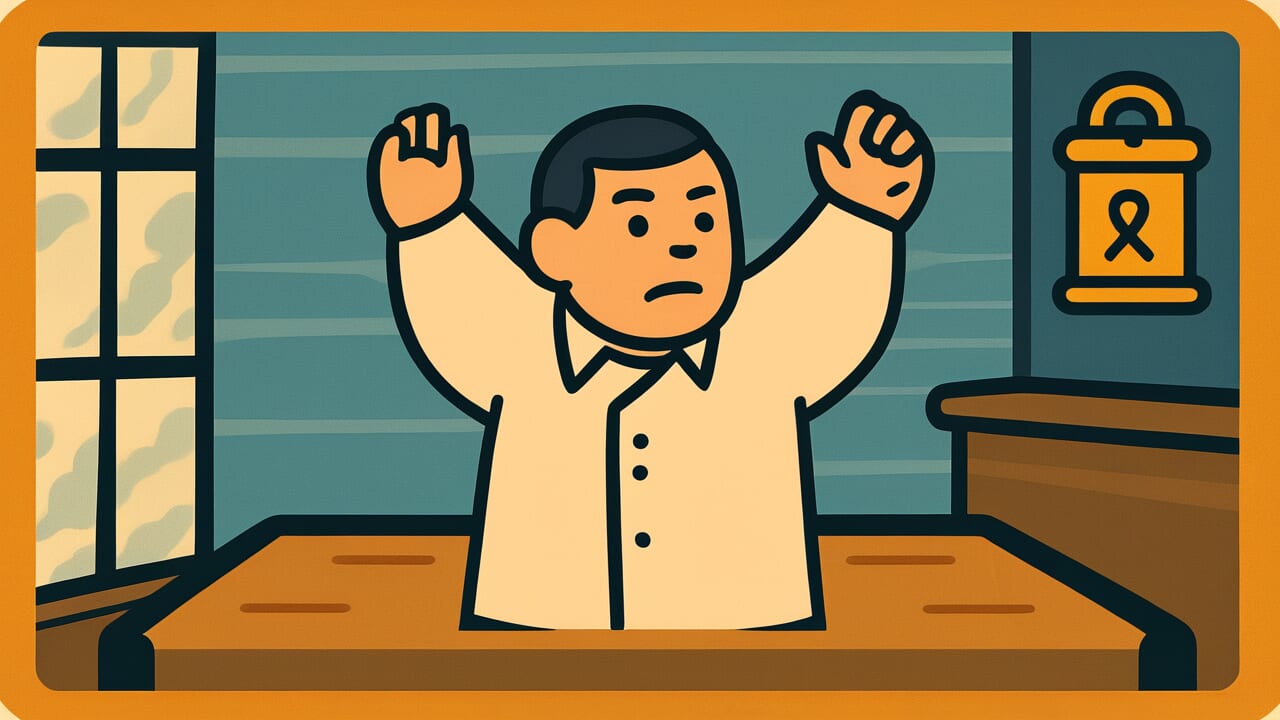How to Read “Punishment does not dislike being light”
Kei wa karuki wo itowazu
Meaning of “Punishment does not dislike being light”
This proverb teaches that even when punishment is light, you should accept it honestly without complaining or trying to avoid it.
When you make a mistake, you shouldn’t grumble just because the penalty is minor. You shouldn’t try to escape it either.
The important thing is to accept any punishment sincerely, no matter how small.
This expression exists because people tend to take light punishments less seriously. When facing heavy punishment, people brace themselves and accept it.
But with light punishment, they think “it’s just this much” and treat it casually. They might even feel it’s unfair.
The proverb warns against this mental weakness. It teaches the importance of humbly accepting the consequences of your actions, regardless of how severe the punishment is.
Today, people use this saying when talking about taking responsibility or facing even small mistakes with sincerity.
Origin and Etymology
The exact origin of this proverb isn’t clearly documented in historical records. However, we can make interesting observations from how the phrase is constructed.
“Punishment does not dislike being light” likely reflects the influence of ancient Chinese legal philosophy.
In Confucian moral thought especially, people who committed wrongs were expected to acknowledge their guilt. Accepting appropriate punishment was considered virtuous.
The key part of this phrase is “being light.” It’s natural to accept heavy punishment.
But the teaching emphasizes that even light punishment shouldn’t be dismissed or avoided. You should take it seriously.
The proverb warns against the human tendency to underestimate light punishments.
In Japan, this idea connected with the samurai spirit during the Edo period. Taking responsibility for your mistakes with dignity was considered a virtue.
No matter how small the punishment, it results from your own actions. Accepting it humbly refines your character.
This saying shows a deep ethical view. In a society that values law and discipline, what matters isn’t the severity of punishment.
What truly matters is the attitude with which you accept it.
Usage Examples
- You only got a light warning, so accept it honestly with the spirit of “punishment does not dislike being light”
- They let you off with just a written apology, so show your remorse with “punishment does not dislike being light”
Universal Wisdom
The proverb “Punishment does not dislike being light” reveals a deep truth about human psychology.
Strangely, we can face heavy punishment with resolve, but we complain about light punishment.
This connects deeply with our “cost-benefit calculation” psychology. With heavy punishment, we resign ourselves thinking “it can’t be helped.”
But with light punishment, we think “couldn’t I have avoided this?” or “shouldn’t it be even lighter?”
In other words, lighter punishment gives us more room to justify ourselves.
Our ancestors understood this human psychology. True reflection doesn’t depend on how severe the punishment is.
No matter how small the penalty, it resulted from your own actions. Can you face this fact without looking away?
Can you accept it humbly? Your character shows in these moments.
This proverb has been passed down through generations for good reason. It shows a universal truth about human growth.
You need to face small mistakes sincerely. People who can honestly accept light punishment are people who won’t commit big mistakes.
When AI Hears This
The human brain processes gains and losses asymmetrically. For example, losing 10,000 yen hurts about 2.5 times more than gaining 10,000 yen feels good.
This is the core of prospect theory. When we analyze punishment through this theory, interesting facts emerge.
When punishment is viewed as “loss,” light punishment causes small psychological pain. People can accept it relatively calmly.
But as punishment becomes heavier, loss aversion bias kicks in strongly. Dissatisfaction and resistance increase rapidly.
In other words, punishment severity and psychological suffering don’t have a proportional relationship. As punishment gets heavier, dissatisfaction accelerates exponentially.
The reference point problem is also noteworthy. Humans judge gains and losses based on a “zero point” – maintaining the status quo.
With light punishment, the feeling “I’m still close to normal life” remains. The deviation from the reference point is small.
But heavy punishment moves far from the reference point. This creates psychological disconnection, and trust in the system itself can collapse easily.
This proverb understood not the physical weight of punishment, but the psychological acceptance limits of humans.
In an era without neuroscience knowledge, people grasped the asymmetry of loss aversion through experience.
Legal stability actually rests on deep insight into human cognitive biases.
Lessons for Today
This proverb teaches modern people the importance of not running from small responsibilities.
In modern society, big failures get attention. But daily small mistakes and light warnings often get brushed aside.
However, your character is truly shaped by your attitude in such small moments.
People who can honestly accept light warnings build great trust. Conversely, people who make excuses for minor criticism can’t take responsibility when it really matters.
Small corrections at work, gentle scolding at home, soft criticism from friends – these are gifts from people who care about you.
Getting off with light warnings instead of heavy punishment shows their expectations and trust in you.
That’s why light punishments and warnings deserve your sincere acceptance. They’re chances to grow yourself and opportunities to deepen trust with those around you.
By continuing to fulfill small responsibilities, you steadily move closer to becoming a better version of yourself.



Comments